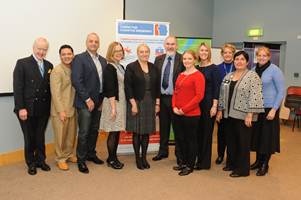The Central Adelaide Local Health Network is focusing its Caring for Cognitive Impairment commitment as an early adopter in two acute care sites:
- The Royal Adelaide Hospital, a 650 bed tertiary referral center and teaching hospital of the Universities of Adelaide and South Australia; and
- The Queen Elizabeth Hospital, a 342 bed acute care teaching hospital.
Our initiatives
Two key pilot programs have been implemented as part of the Central Adelaide Local Health Network’s (CALHN) cognitive impairment work:
The CALHN Dementia Care in Hospitals National Pilot Program at the Queen Elizabeth Hospital. The pilot program:
- Aims to promote positive culture and practice change in the care of patients with memory and thinking difficulties, and engagement with their carers
- Is led by Ballarat Health Services team, and is supported by the South Australia Department of Social Services, in association with Alzheimer’s Australia and Deakin University
- Is also being conducted at the Canberra Hospital, Sir Charles Gairdner Hospital and the Royal Perth and Royal Hobart Hospitals.
In June 2016, the CALHN team participated in a two day educational forum with the Canberra Hospital, focusing on reducing distress for people with dementia in hospital. In turn, the Canberra Hospital nursing team also visited the CALHN.
The implementation of the CALHN Dementia Care in Hospital National Pilot Program. The pilot program has included the introduction of:
- Screening for cognitive impairment using the Abbreviated Mental Test Score (AMTS) as the screening tool. In geriatric wards, the Mini-mental State Examination (MMSE) or Rowland Universal Dementia Assessment Scale (RUDAS) remains in use
- Use of a unique bedside alert – the ‘cognitive impairment identifier’
- A range of dedicated multidisciplinary evidence-based education training sessions on patient-centred management of delirium and dementia (including management for Behavioral and Psychological Symptoms of Dementia (BPSD) – responding to changed behaviors and ‘Code Black’ restraints policies and delirium guidelines).
At the end of March 2016, wards had screened more than 2 600 patients for cognitive impairment, with over 30% of patients receiving a positive screen.
Caring for Cognitive Impairment campaign launch
The CALHN held a launch of the Caring for Cognitive Impairment campaign on 27 May 2016, at the Royal Adelaide Hospital as a way for CALHN staff and its external partners to connect to the campaign.

Photo from the Caring for Cognitive Impairment campaign launch event (left to right, image above).
- Dr Rob Prowse – CALHN Geriatrician
- Dr Faizal Ibrahim – CALHN Geriatrici
- Brett Partington – Consumer representative and dignity in care championan
- CALHN Executive Nursing Director – Fiona McKenzie
- CALHN CEO – Julia Squire
- Ballarat Executive Team – Dr Sean McDermott, Michelle Morvell and Meredith Theobald
- CALHN Surgical Directorate – Dianne Rogowski
- CALHN Nursing Director – Karen Hales
- CALHN Medical Directorate – Jackie Wood.

Consumer representative, Brett Partington, presented at the CALHN Caring for Cognitive Impairment campaign launch (image below). Staff were impressed by Brett’s motivation and courage to share details of his father Bob’s, and, his family’s experiences with cognitive impairment.
Outcomes
As of mid-January 2016:
- The average cognitive screening rates for patients aged 65 years and over admitted to The Queen Elizabeth Hospital improved to 90%. With around 60% to 70% of wards are now using the ‘cognitive impairment identifier’
- Over half of the Queen Elizabeth Hospital staff (doctors, nurses, students, pharmacists, physiotherapists, social workers, speech therapists, occupational therapists, dieticians and ancillary staff, domestic, kitchen and security) completed the Dementia Care in Hospitals Pilot education training
- The official Caring for Cognitive Impairment launch gave CALHN senior managers, decision-makers and staff the opportunity to hear about and identify education and practice changes that can be implemented in the future. The educations sessions and visits between the Canberra Hospital and CALHN have bolstered collaboration and sharing of ideas and good practice.
Challenges
- Implementing strategies in preparation for the new Royal Adelaide Hospital and the implementation of Transforming Health in South Australia, and staff engagement with any new program introduction.
Helpful hints for others
- Strong executive leadership suppor
t is key to success. Executives were engaged and committed to the improvement of care for people with cognitive impairment, which assisted development and implementation of strategies. - External partnerships, supported by strong consumer engagement, were pivotal in informing strategies.
Where to from here?
- A continued strong focus on the provision for excellence in training, education and knowledge translation for cognitive care.
- Use of CALHN patient and staff satisfaction results, and, key performance indicators as a yardstick to measure effectiveness of CALHN’s Caring for Cognitive Impairment campaign initiatives.


